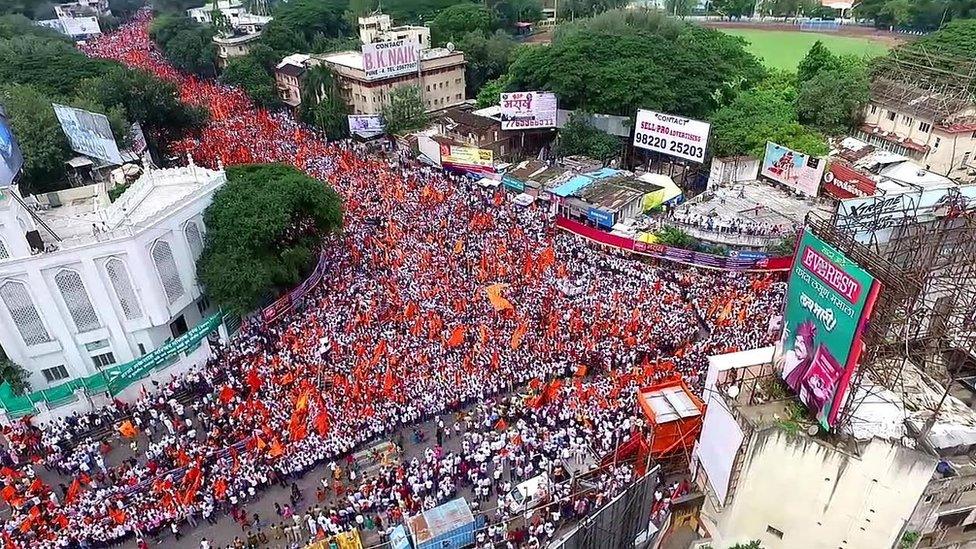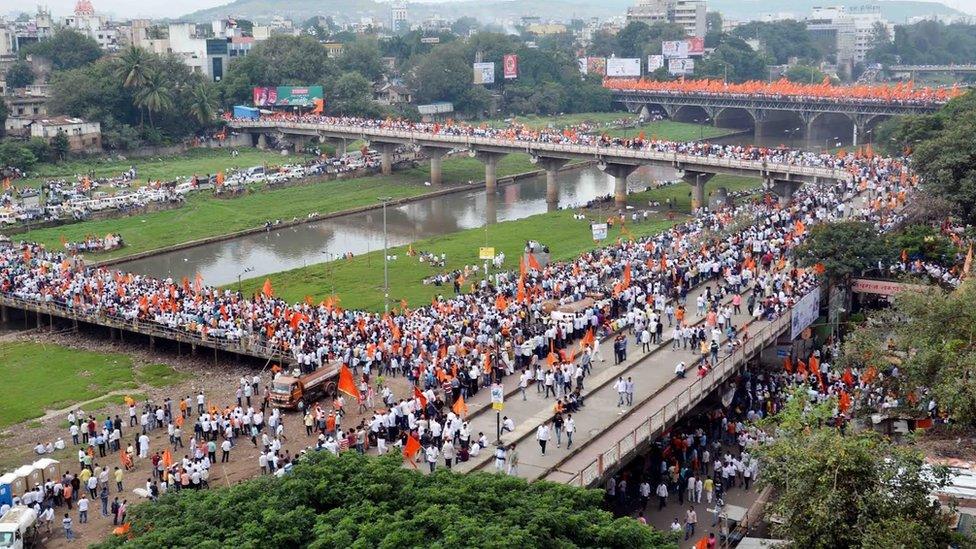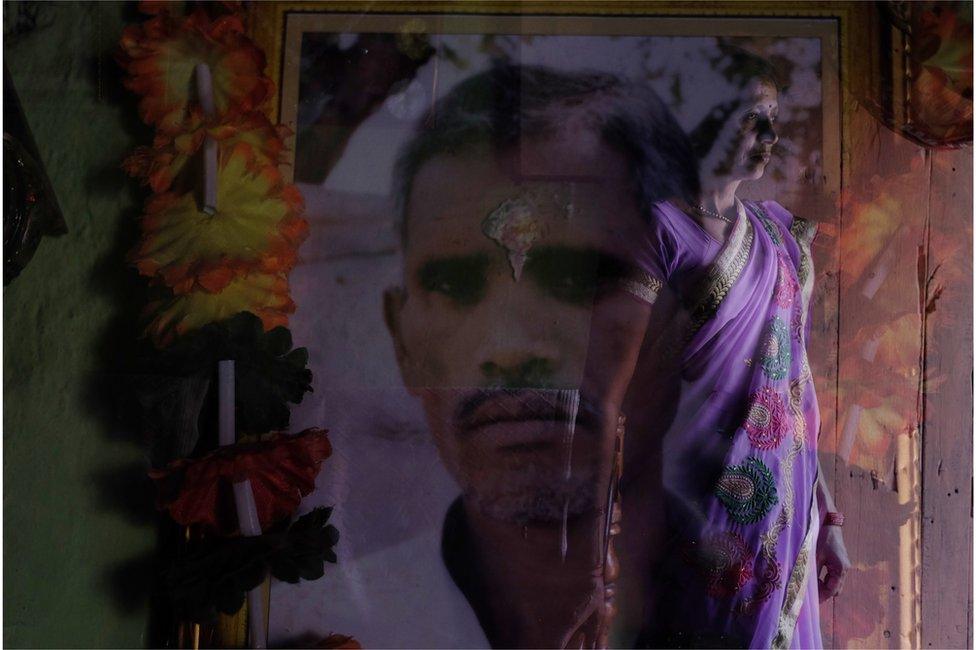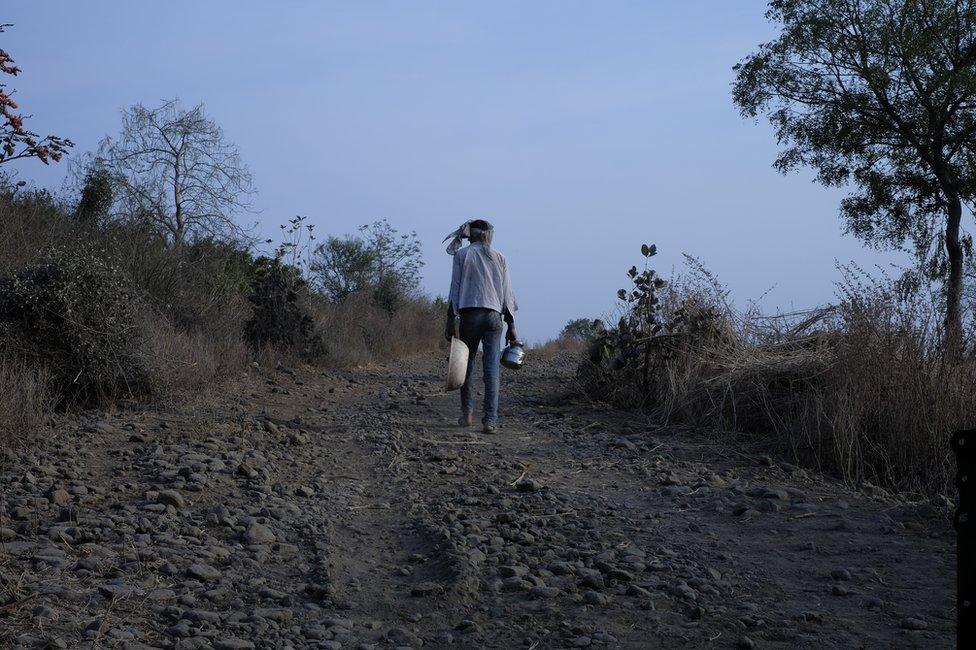Why are millions of Indians marching in silence?
- Published

Millions of Marathas have participated in the marches across Maharashtra
For the past six weeks, millions of people have been marching silently across Maharashtra, a state as populous as Mexico.
It is a unique protest: the silent marchers have no leaders; and they include the peasant and the professional. Women lead many of the marches; and politicians are not allowed to seize them. It is a sound of silence, says a commentator, that India can ill afford to ignore.
The protesters belong to the Maratha caste, one of India's proudest - the warrior king Shivaji was one of them. Mostly farmers, they comprise more than a third of the population of Maharashtra, a relatively prosperous state, which is home, on one hand to Bollywood, thriving factories and farms and on the other, malnourished children and neglected tribespeople living in abject poverty.
Huge protests
The rape of a teenage Maratha girl allegedly by three low caste Dalit men triggered the silent marches in July. Then the protests expanded to include a demand for quotas in college seats for students and government jobs and a review of a 27-year-old federal law that protects Dalits and tribespeople, external from caste-related atrocities.
After more than 20 such rallies, the silent marchers - who call themselves the Maratha Revolutionary Silent Rallies - are expected to gather in the western Indian state capital, Mumbai, at the end of October. More than 10 million people are expected to participate in what could turn out to be one of largest protests in India in recent memory.
The upper-caste, largely land-owning Marathas have a handful of grumbles.
For one, they have turned their ire on the Dalits and tribespeople, alleging that the law to protect them has become a pretext to target the upper caste community, and lodge false cases against them. (The victims also get state compensation, external for as many as 47 offences against them.)

But this may not be an entirely truthful claim. Although dalits and tribespeople - India's wretched of the earth - comprise 19% of Maharashtra's population, only 1% of the police complaints were filed by them last year, according to one report, external. Also the federal law was applicable in less than 40% of the complaints.
Social unrest
Clearly this disingenuous grievance masks a longer-standing demand: caste quotas in government jobs and seats in educational institutions. India's Supreme Court has put a 50% cap on caste quotas, a limit that has already been reached in Maharashtra. Any concessions to the Marathas will mean that they will have to be officially labelled backward or less-privileged and the quotas will have to come at the expense of those for the less privileged castes. This could potentially trigger bloody caste wars, external in the state.
The silent marchers of Maharashtra point to a host of structural infirmities afflicting India, which, if not resolved in time, could stoke widespread social unrest.
Growing inequity and decades of flagrant cronyism has meant that power and wealth continue to belong to a few.
The majority of colleges, cooperative banks and sugar factories in Maharashtra, for example, are owned by a clutch of politicians. According to one estimate, 3,000 families own more than 70% of all the farms in the state. The majority of the state's 18 chief ministers have been Marathas. Half of its lawmakers belong to the community as well.

Maratha farmers have taken their lives after they failed to repay debts
But caste and class don't often coalesce in India, and the Marathas, like other upper caste communities have mixed fortunes: they are the educated elite and the rich farmers, but they are also the struggling small and landless farmers and farm workers. More than a third of Marathas are landless, according to one estimate.
It is the "lower and middle-rung Marathas who feel isolated, neglected, marginalised in the job market and denied opportunities in higher education," in a fast-changing country, as commentator Kumar Ketkar points out in this perceptive essay on the ongoing protests, external.
The silent marches also shine a spotlight on its looming farm crisis as farmer incomes plummet due to expensive feedstuff, fertiliser, labour and erratic crop prices.
Frustration
Plot sizes have also shrunk, making farming unrewarding. Most of India's farms are rain fed, and irregular weather changes are playing havoc with crops as rivers are drying up, and drought is common. Farmers are often left to fend for themselves and have no skills for jobs in India's services-based economy. Aspiration is turning into frustration.
The Maratha protests also point to how India is veering towards what sociologist Andre Beteille called a "populist democracy" where social and political life are influenced by group identities and loyalties. "Problems arise when the loyalties of kinship and community are allowed to distort and override the demands of constitutional government," wrote Professor Beteille.

Farming is becoming an unrewarding profession
Many believe India's quotas for seats and jobs are in a sordid mess of its own making.
It is indisputable that affirmative action is essential for communities like dalits and tribespeople who have been historically wronged. But extending it to other castes recklessly can distort matters.
How much burden of quotas can a state bear without being weakened irreparably? India needs jobs - and fast - and skills training if it has to avoid the social unrest that could blight a developing nation. Otherwise, the marchers of Maharashtra may not remain silent for long.